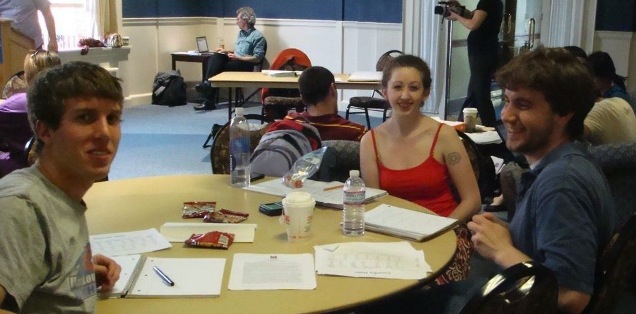The Power of Games: Changing our Mental Models
By
Ellie Johnston
June 28, 2012
 Guest post by Cecelia Hunt:
Guest post by Cecelia Hunt:
Simulation games, like Climate Interactive’s World Climate Exercise, have the capacity to shift mental models. Mental models are frameworks that we construct subconsciously, which help us to understand and predict the world around us. They are dynamic and change based on our understanding of reality. Our mental models serve as useful tools in problem solving, but are often incomplete and can be inaccurate, because they are a personalized representation of reality rather than reality itself.
The flaws in our mental models can constrict our understanding of the world. When faced with new information, we typically try to incorporate it into our existing mental models, rather than change our models to match the information, thus leading to misconceptions. We also tend to use our mental models to filter information, and seek evidence for (but not against) our conceptions. For example, the “snowpocalypse” of winter 2010-2011 may serve as evidence of increased extreme events expected from climate change to proponents of human-caused climate change. To those who do not believe in human-caused climate change, however, this may be seen as confirmation of their belief that Earth cannot be warming.
Mental models play a role in the polarized views of climate change among the American public. , Because of the way we use our mental models, however, they often cannot simply be fixed through providing more information.
In a simulation, players interact with one another, participate in active learning, and experience a modeled version reality where they can learn from their actions. They are faced with a problem, and must find a solution. During a simulation game, players face the flaws in their understanding, and rebuild their mental models. Climate Interactive and MIT’s World Climate game is capable of not only yielding a mental model shift but also a much deeper understanding of climate change.
I examined the written responses of students who had taken the UMass Lowell course “Climate Change: Science, Communication, Solutions”. These students had spent much of the semester intensively learning the science of climate change, and were knowledgeable on the subject. They understood the urgency of greenhouse gas emission mitigation in order to limit average global temperature increase. Toward the end of the semester, the students played the 6-bloc version of World Climate. After the game, they were asked to write a reflection piece discussing the impacts of the game. Despite their prior knowledge of the subject matter, the students reported a change in the way they viewed the issue. They had a stronger understanding of the urgency of climate change, and the delays in the system. They also noted how “tragedy of the commons” prevents action, as each of the negotiating blocs was more concerned about their own country rather than the greater good.
The student responses suggested that World Climate caused a transformation in their conceptual understanding of climate change and the challenges to mitigation:
•“Hearing about the failure of policy makers is not nearly as effective as experiencing that failure firsthand, even in the setting of a game.”
•“The game illustrated what it would take to stay below a two-degree temperature rise. I have heard the figures, but the game demonstrated how drastic the global action must be to accomplish this.”
•“We knew from class how much emissions needed to change to improve our situation, but the game showed me how difficult it would be to achieve this on a global level.”
Cecelia Hunt is a recent graduate from the University of Massachusetts Lowell Biological Sciences Masters program, where she researched the impact of Climate Interactive’s World Climate Exercise.
Further reading on mental models and simulation games:
Enciso RZ. 2001. Simulation games, a learning tool. Proceedings of the International Simulation and Gaming Association .
Frese M, Albrecht K, Altmann A, Lang J, Papstein PV, Peyerl R, Prümper J, Schulte-Göcking H, Wankmüller I, Wendel R. 1988. The effects of an active development of the mental model in the training process: Experimental results in a word processing system. Behaviour & Information Technology 7(3):295-304.
Jones NA, Ross H, Lynam T, Perez P, Leitch A. 2011. Mental models: An interdisciplinary synthesis of theory and methods. Ecology and Society 16(1):46.
Landriscina F. 2009. Simulation and learning: The role of mental models. Journal of e-Learning and Knowledge Society-English Version 5(2).
Moxnes E and Saysel AK. 2009. Misperceptions of global climate change: Information policies. Clim Change 93(1):15-37.
Rebich S and Gautier C. 2005. Concept mapping to reveal prior knowledge and conceptual change in a mock summit course on global climate change. Journal of Geoscience Education 53(4):355.
Samarapungavan A, Vosniadou S, Brewer WF. 1996. Mental models of the earth, sun, and moon: Indian children’s cosmologies. Cognitive Development 11(4):491-521.
Scherpereel CM. 2005. Changing mental models: Business simulation exercises. Simulation & Gaming 36(3):388-403.
Shome D, Krantz D, Leiserowitz A, LoBuglio M, Logg J, Mazhirov A, Milch K, Nawi N, Peterson N, Soghoian A. 2009. The psychology of climate change communication: A guide for scientists, journalists, educators, political aides, and the interested public. .
Sterman JD, Fiddaman T, Franck T, Jones A, McCauley S, Rice P, Sawin E, Siegel L. 2011. World climate: A role-play simulation of global climate negotiations.
Sterman JD. 2002. All models are wrong: Reflections on becoming a systems scientist. System Dynamics Review 18(4):501-31.
Vosniadou S and Brewer WF. 1992. Mental models of the earth: A study of conceptual change in childhood. Cognit Psychol 24(4):535-85.
Vosniadou S. 1994. Capturing and modeling the process of conceptual change. Learning and Instruction 4(1):45-69.

